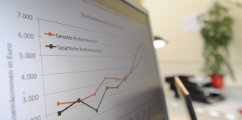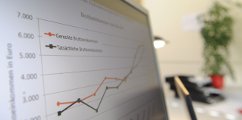Project C5
- Albert, Mathias, Prof. Dr.
- Head of Project C5
- Freistein, Katja, Dr.
- Research associate Project C5
- Koch, Martin, Dr.
- Head of Project C5
This project deals with the emergence of a global semantics of inequality within world society. Through three comparative case studies it traces how ideas about global social inequality that draw on various aspects of heterogeneity have developed in international organizations, both programmatically and on the policy level. In addition, the project is particularly interested in the question of whether it is specific global discourses, e.g. on issues of justice, the climate, environmental protection, security etc., that serve as the main vehicles for the emergence of such a global semantics of inequality.
The main project goal is to describe shifts in semantics of inequality in world society and to map this shift in a detailed fashion in the context of the case studies. In particular, these case studies focus on reports, statistics, and policy statements of three international organizations (World Bank, UNDP, OECD). Changes in notions of inequality, which are reflected in semantics have effects on how ‘progress’ in development is quantified, and it has a tangible effect on the projects and measures of international organizations. These semantics emerge within a cycle of communication between national and international, public and private actors concerning problems in economic and social development.
The text corpus to be analyzed includes development-related reports, statistics, and policy statements of international organizations. These are supplemented by reports, policy proposals, and working papers ("nonpapers") written by administrative units within the organizations. Negotiation protocols will be analyzed in order to determine how specific ideas have gained entry to and shaped the semantics of inequality. In this process, the project will seek to identify more directly the different actors involved in the formation of particular notions of inequality, most particularly organizational staff, representatives of member states, representatives of other governmental and nongovernmental organizations, or experts from the academic community. These groups of actors do not only participate in the formation of certain ideas on inequality, but to some extent are also addressees of specific measures or proposals, e.g. member states which benefit from a programme and who then possibly also adopt these notions of inequality within their own programs and policy formulations. Such an approach is also able to account for the influence of NGOs on the forms of observation and the subsequent policy formulations by international organizations.
16 Publications
Freistein K (2014) SFB 882 Working Paper Series; 38.
Bielefeld: DFG Research Center (SFB) 882 From Heterogeneities to Inequalities.
Fehl C, Freistein K (2014) SFB 882 Working Paper Series; 37.
Bielefeld: DFG Research Center (SFB) 882 From Heterogeneities to Inequalities.
Freistein K, Koch M (2014) SFB 882 Working Paper Series; 27.
Bielefeld: DFG Research Center (SFB) 882 From Heterogeneities to Inequalities.
Albert M, Mahlert B (2013)
In: Ordnung und Wandel in der Weltpolitik. Konturen einer Soziologie der internationalen Beziehungen. Stetter S (Ed); Leviathan. Sonderband, 28 Baden-Baden: Nomos: 59-77.
Albert M, Buzan B, Zürn M (2013)
Cambridge: Cambridge University Press.
Albert M, Kessler O (2013)
In: Recht und Politik globaler Sicherheit. Fischer-Lescano A, Mayer P (Eds);350 Seiten Frankfurt am Main: Campus: 335-362.
Albert M, Buzan B (2013)
International Political Sociology 7(2): 117-135.
Freistein K, Leininger J (Eds) (2012) Lehr- und Handbücher der Politikwissenschaft, 1st ed.
München: Oldenbourg Verlag.
Freistein K, Koch M (2012) SFB 882 Working Paper Series; 12.
Bielefeld: DFG Research Center (SFB) 882 From Heterogeneities to Inequalities.
Freistein K (2012) Hessische Stiftung Friedens- und Konfliktforschung, 1st ed.
Baden-Baden: Nomos.
Albert M, Cederman L-E, Wendt A (Eds) (2010) Palgrave studies in international relations.
London: Palgrave.
Wodsak V, Koch M (2010)
In: Owning Development. Park S, Vetterlein A (Eds); Cambridge: Cambridge University Press: 48-69.
Albert M, Bluhm G, Helmig J, Leutzsch A, Walter J (Eds) (2009) Historische Politikforschung, 18.
Frankfurt a.M.: Campus.
Albert M, Bluhm G, Helmig J, Leutzsch A, Walter J (2009)
In: Transnational Political Spaces. Agents - Structures - Encounters. Albert M, Bluhm G, Helmig J, Leutzsch A, Walter J (Eds); Frankfurt a. M.; New York: Campus: 7-31.
Kopp-Malek T, Koch M, Lindenthal A (2009)
Wiesbaden: VS Verlag.












